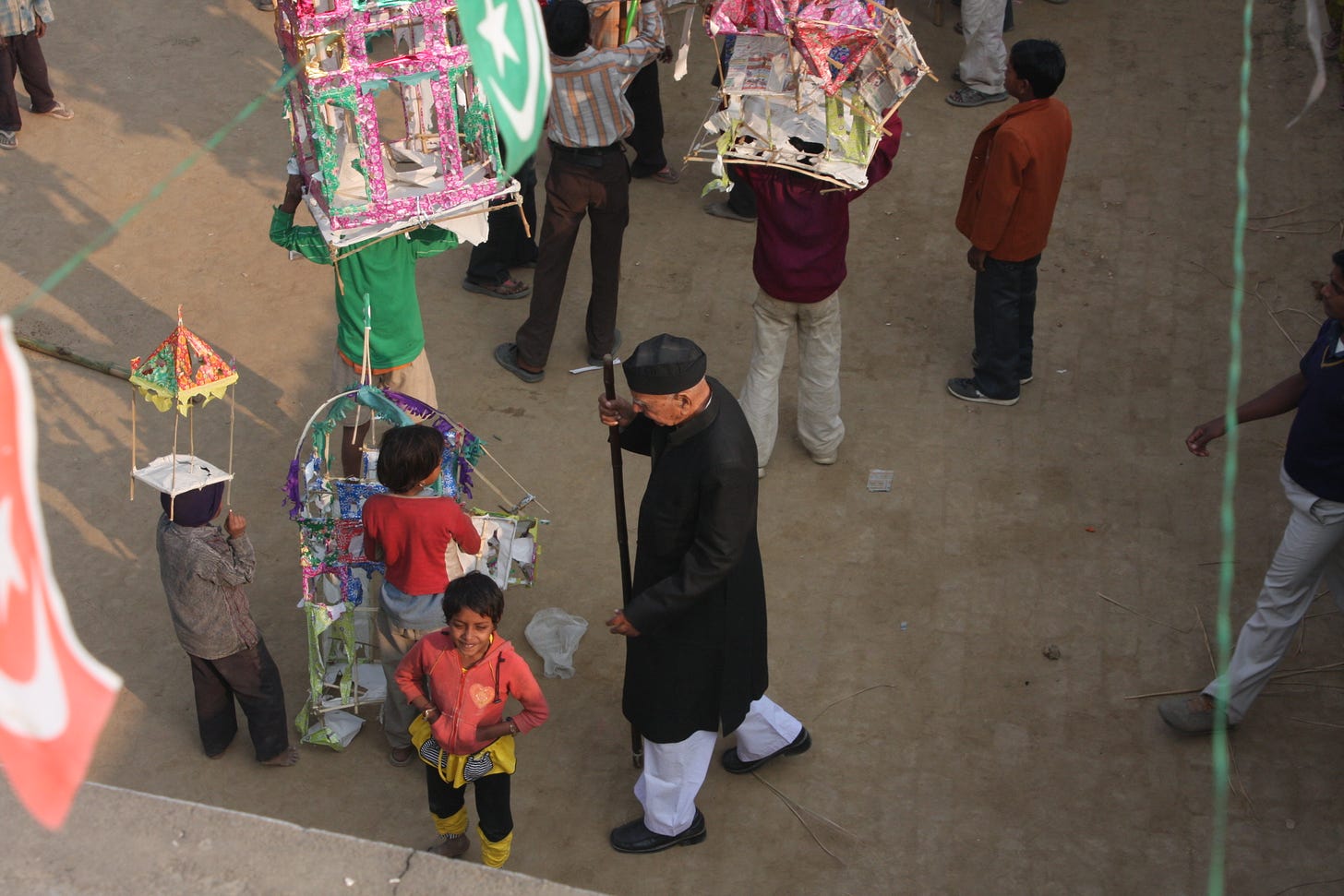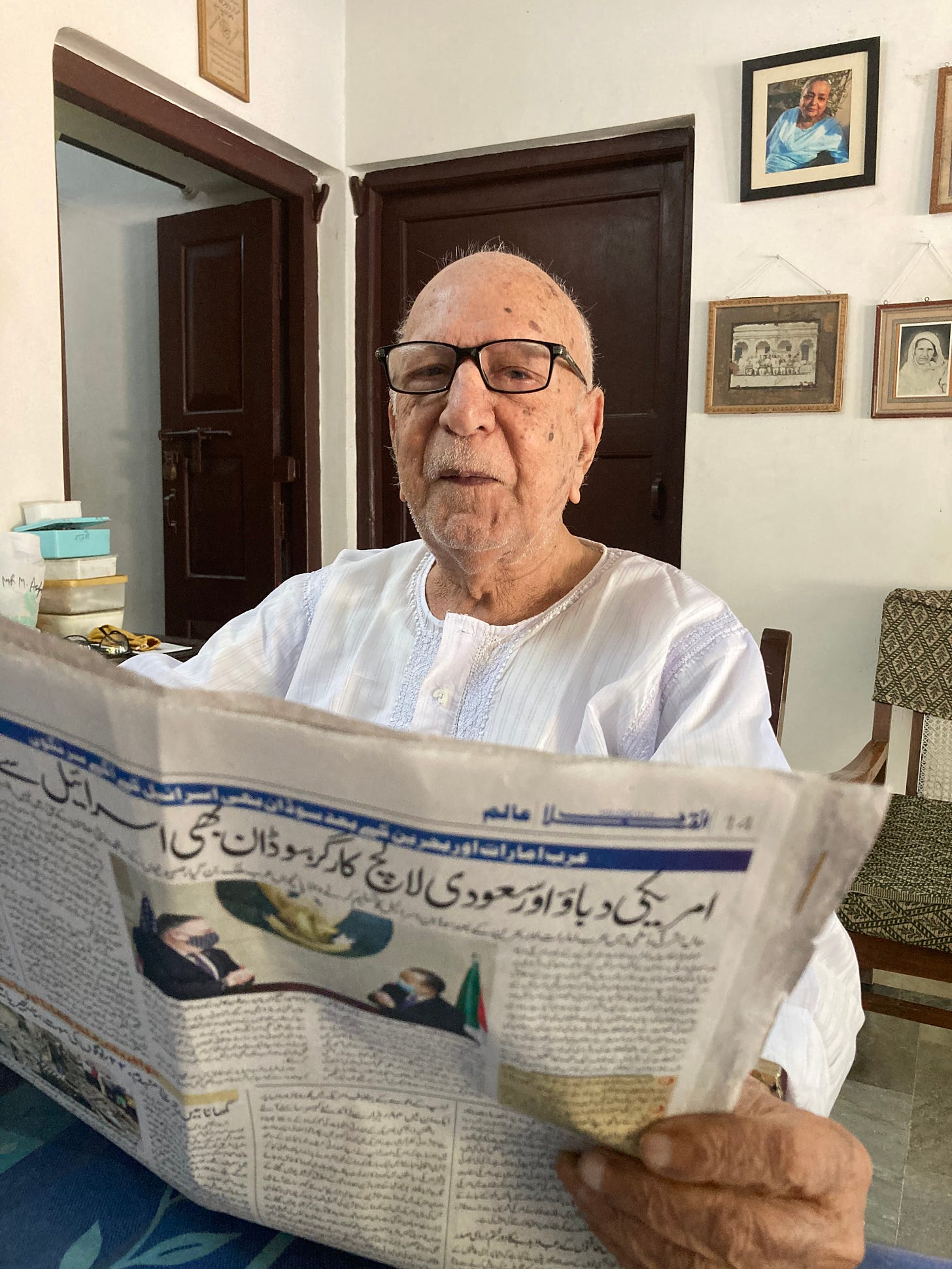Peace and resistance in times of strife
Welcome to a day in the life of a village in north India aka the badlands of east Uttar Pradesh
I wake up on the roof, under a pale blue sky. It is ridiculously early. I am on a single bed, with a mosquito net around me, luminous in the light of dawn. The night breeze has been my sanctuary.
Even before I am fully awake, I pick up my phone and through the net, take a photo of the sun rising in the distance.
Another of my daughter sleeping in the adjacent bed.
I get out and take another photo of three folding beds in a row, covered by gently swaying mosquito nets in pastel shades, balanced on bamboo sticks propped up on two sides of the beds.
When I send these photos to friends and family later in the day, nearly everyone will reply with memories of summer vacations in their childhood when they also slept on the terrace of their homes. Of cooling the floor with water first, then laying the beds. Of gazing at stars and scaring each other with ghost stories.
I walk to the parapet wall of the roof and look down at the empty village square in front of our home. Sleeping dogs lie scattered on the brick-layered ground. The village well and mosque on one side. A corner where samosas and tea will be available later in the day. Three rabbits sleep in a cage outside a home. Goats flap their ears to get rid of flies.
On the other side, a mud-walled centre is the hub for digital facilities in the village. In the day time, students will gather here for tuitions and to access Wi-Fi. Adults will visit to get their KYC updated in various government welfare schemes and to fill forms online. My daughters and I will go there to access online classes. I will teach and attend meetings on Zoom.
We are in Ghazipur district in east Uttar Pradesh. A vast maulshree tree at the centre of the village square is home to the chatter of birds, excited at the prospect of a new morning. In this part of India, the tree is pronounced as mulsari. In the evening, my father-in-law, Mirza Ashfaq Beg, now in his 90s, will sit here on his wheelchair, surrounded by generations of villagers.
Papa and the tree — both are elderly, sagacious witnesses to the passage of time. In some ways, time seems to have stood still. In other ways, change has come so suddenly that it feels like a cool breeze that is cleansing layers of tenacious dust.
In another hour, it will be time for school and morning tuitions. Groups of students in uniform, supporting their siblings, chatting with friends will walk past here. Straight-backed girls with hair combed tight will cross on their bicycles, their school bags balanced on their shoulders. This is a new sight here, quickly normalised by the young women themselves.
I have stood on this roof and watched the intense events of the Muharram procession, led by Papa and other elderly men in the village. The aesthetic decoration of the taziya, a replica of the mausoleum of Imam Hussain, the grandson of Prophet Muhammad, is done by Hindu artisans and tailors in the village. There are no Shia Muslims in this village. But Muharram is an integral tradition for everyone.
There is an unspoken dread that the tradition of the Muharram procession and the rituals associated with it are under threat. Not all change is progressive. Communities stripped of the permission to express their identity through festivals and rituals in common spaces lose something intangible about their sense of self-worth. Their sense of belonging weakens.

On the evening before Holi, the bonfire for Holika dahan is also lit by Papa in this square. Diwali is celebrated here by all communities together. I cannot see the temples of this village from our terrace, but I can hear all of them. They love their loudspeaker technology.
It was Eid-ul-Fitr nearly two weeks ago. For the first time, there were strict orders from the administration that no one will be allowed to offer namaz outside of the mosque and Eidgah premises. Every year, when Muslim men congregate on the morning of Eid to offer prayers together in the Eidgah — a vast space set apart for this annual namaz — the latecomers spill out of the boundaries.
Hawkers collect outside the Eidgah with painted mud toys, gas balloons and crunchy snacks for the children who accompany their fathers on the morning of Eid. It has been an annual mela everyone looks forward to.
This year is the first time that no one from our family has gone to the Eidgah. To prevent repression, it was collectively decided to congregate in smaller groups in mosques so that there was no spilling out of the Eidgah. There is an amazing grace in the community here.
When I stepped out of our home on Eid and saw policemen sitting outside the mosque, on the bench under the mursali tree, I was distressed on behalf of everyone else. I wanted to text a friend. TYPE MY RAGE IN ALL CAPS. Express my incoherent sense of loss.
I take a cue from everyone around me and decide to save my emotional energy. We will choose the challenges that deserve our engagement. Newly pasted on my desktop as a reminder to myself is a quote by Mary Karr, poet and memoirist:
“Empathy deepens us, yet how we unwittingly sabotage our own capacities for it. We care because we are porous. Pain is at once actual and constructed, feelings are made based on how you speak them.”
As I go down to start my day, I meet Papa at the dining table, reading the Urdu newspaper, The Inquilab.
“What is the taaza khabar today, Papa?” I ask him. “Any hot news?”
“Nothing in particular,” he says, folding the newspaper.
“I heard Mirza Sahab’s bahu is visiting these days. Have the papers reported it?”
“Oh yes,” he says, with a twinkle in his eye. “It’s the lead story. How did you know? Do you read Urdu?”
“I have my sources,” I say, making him laugh.
A shorter version of this essay was published here










बदलाव हमेशा दिशाहीन प्रलय की तरह है , वो होता रहता है और बहुत कुछ समेटकर चला जाता है ,
Beautifully evocative description of the village.
I feel your pain about the recent change.
Will stop now before I type in CAPITALS or swear.